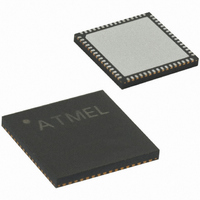AT32UC3B0512-Z2UR Atmel, AT32UC3B0512-Z2UR Datasheet - Page 553

AT32UC3B0512-Z2UR
Manufacturer Part Number
AT32UC3B0512-Z2UR
Description
IC MCU AVR32 512K FLASH 64QFN
Manufacturer
Atmel
Series
AVR®32 UC3r
Datasheet
1.AT32UC3B164-AUR.pdf
(680 pages)
Specifications of AT32UC3B0512-Z2UR
Package / Case
64-QFN
Voltage - Supply (vcc/vdd)
1.65 V ~ 1.95 V
Operating Temperature
-40°C ~ 85°C
Speed
60MHz
Number Of I /o
44
Core Processor
AVR
Program Memory Type
FLASH
Ram Size
96K x 8
Program Memory Size
512KB (512K x 8)
Data Converters
A/D 8x10b
Oscillator Type
Internal
Peripherals
Brown-out Detect/Reset, DMA, POR, PWM, WDT
Connectivity
I²C, IrDA, SPI, SSC, UART/USART, USB
Core Size
32-Bit
Lead Free Status / RoHS Status
Lead free / RoHS Compliant
Eeprom Size
-
Available stocks
Company
Part Number
Manufacturer
Quantity
Price
Company:
Part Number:
AT32UC3B0512-Z2UR
Manufacturer:
ATMEL
Quantity:
2 010
- Current page: 553 of 680
- Download datasheet (10Mb)
25.5.2
25.5.3
25.5.4
25.5.5
25.5.6
25.6
25.6.1
25.6.2
25.6.3
32059J–12/2010
Functional Description
Power Management
Clocks
Interrupts
Analog Inputs
Timer Triggers
Analog-to-digital Conversion
Conversion Reference
Conversion Resolution
In sleep mode, the ADC clock is automatically stopped after each conversion. As the logic is
small and the ADC cell can be put into sleep mode, the Power Manager has no effect on the
ADC behavior.
The clock for the ADC bus interface (CLK_ADC) is generated by the Power Manager. This clock
is enabled at reset, and can be disabled in the Power Manager. It is recommended to disable the
ADC before disabling the clock, to avoid freezing the ADC in an undefined state.
The CLK_ADC clock frequency must be in line with the ADC characteritics. Refer to Electrical
Characteristics section for details.
The ADC interrupt request line is connected to the interrupt controller. Using the ADC interrupt
requires the interrupt controller to be programmed first.
The analog input pins can be multiplexed with I/O lines. In this case, the assignment of the ADC
input is automatically done as soon as the corresponding I/O is configured through the I/O con-
toller. By default, after reset, the I/O line is configured as a logic input.
Timer Counters may or may not be used as hardware triggers depending on user requirements.
Thus, some or all of the timer counters may be non-connected.
The ADC uses the ADC Clock to perform conversions. Converting a single analog value to a 10-
bit digital data requires sample and hold clock cycles as defined in the Sample and Hold Time
field of the Mode Register (MR.SHTIM) and 10 ADC Clock cycles. The ADC Clock frequency is
selected in the Prescaler Rate Selection field of the MR register (MR.PRESCAL).
The ADC Clock range is between CLK_ADC/2, if the PRESCAL field is 0, and CLK_ADC/128, if
the PRESCAL field is 63 (0x3F). The PRESCAL field must be written in order to provide an ADC
Clock frequency according to the parameters given in the Electrical Characteristics chapter.
The conversion is performed on a full range between 0V and the reference voltage pin ADVREF.
Analog input values between these voltages are converted to digital values based on a linear
conversion.
The ADC supports 8-bit or 10-bit resolutions. The 8-bit selection is performed by writing a one to
the Resolution bit in the MR register (MR.LOWRES). By default, after a reset, the resolution is
the highest and the Converted Data field in the Channel Data Registers (CDRn.DATA) is fully
used. By writing a one to the LOWRES bit, the ADC switches in the lowest resolution and the
conversion results can be read in the eight lowest significant bits of the Channel Data Registers
AT32UC3B
553
Related parts for AT32UC3B0512-Z2UR
Image
Part Number
Description
Manufacturer
Datasheet
Request
R

Part Number:
Description:
DEV KIT FOR AVR/AVR32
Manufacturer:
Atmel
Datasheet:

Part Number:
Description:
INTERVAL AND WIPE/WASH WIPER CONTROL IC WITH DELAY
Manufacturer:
ATMEL Corporation
Datasheet:

Part Number:
Description:
Low-Voltage Voice-Switched IC for Hands-Free Operation
Manufacturer:
ATMEL Corporation
Datasheet:

Part Number:
Description:
MONOLITHIC INTEGRATED FEATUREPHONE CIRCUIT
Manufacturer:
ATMEL Corporation
Datasheet:

Part Number:
Description:
AM-FM Receiver IC U4255BM-M
Manufacturer:
ATMEL Corporation
Datasheet:

Part Number:
Description:
Monolithic Integrated Feature Phone Circuit
Manufacturer:
ATMEL Corporation
Datasheet:

Part Number:
Description:
Multistandard Video-IF and Quasi Parallel Sound Processing
Manufacturer:
ATMEL Corporation
Datasheet:

Part Number:
Description:
High-performance EE PLD
Manufacturer:
ATMEL Corporation
Datasheet:

Part Number:
Description:
8-bit Flash Microcontroller
Manufacturer:
ATMEL Corporation
Datasheet:

Part Number:
Description:
2-Wire Serial EEPROM
Manufacturer:
ATMEL Corporation
Datasheet:











